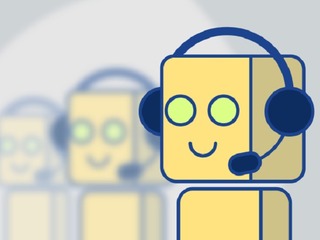Right now, there are generally three ways that people interact with chatbots: either by talking to their phone, like with Siri; by talking to their smart speaker, like with Alexa; or through a customer service channel, like on Facebook Messenger. What we haven’t been able to do is actually talk face-to-face, and have a conservation with, an actual robot. One that can react to us in the same way that another person would.
Now SoftBank is going to change that, as the company revealed earlier this week that it will be integrating chatbot features into its Pepper robot.
For those who don’t remember, Pepper is the “personal robot that reads emotions,” which SoftBank unveiled in June of 2014. That means it not only understands words, but understands the feelings behind them.
The current Pepper solution is being built on Microsoft Azure infrastructure, but SoftBank says that its customers can integrate their own chatbot onto Pepper through cloud-based chatbot platforms including Dialogflow and MSBot by partnering with Satisfi Labs.
“Satisfi is our partner for integrating Chatbot onto Pepper. Whenever SoftBank Robotics launches a new pilot program with a business, Satisfi works directly with that business to customize the chat bot for them to use on Pepper in a way that will work with their business needs,” Steve Carlin, SoftBank Robotics Chief Strategy Officer, explained to me.
“Pepper can become an expert for any business, at any scale. With Satisfi’s intelligent platform, companies have the ability to train their Pepper to know unique, specialized things about their business and ultimately share this with their customers in a fun, engaging way. Pepper also becomes dynamic and can be updated with new knowledge in real time as each business changes.”
A big step forward for Pepper
For Pepper, which has been on sale for two and a half years now, this is perhaps its most important upgrade yet.
“Progressing Pepper’s functionality has been the number one priority for SoftBank Robotics US and the new chatbot integration feature for Pepper is our answer to tackling the conversation experience, a key part of Pepper’s evolution as a true business solution,” said Carlin.
“It’s about the way we’re seeing users interact with all types of technology today. Particularly as AI technology develops we’re seeing a shift to conversational UX throughout the entire tech landscape, at work, in the car, at home; we call to Siri for help with direction, Alexa to help us pull up our favorite song on Spotify, etc. This speech-based, conversational UX is becoming more steeped in our daily lives, and will only continue to do so. Yet many technologies today still force us to disengage from the world around us, robotics can help shift the way we use conversational UX by bringing us back into an experience that encourages physical interaction rather than staring at a screen.”
With this new integration, for example, Pepper can be placed at the front desk of a business to greet new customers. While some might think that would seem impersonal, according to Carlin studies have shown that people are actually “far more likely to engage with a robot, especially a humanoid one, to get the information they need to make a purchase.”
“So imagine a robot located in a show room, perhaps by each car, who could see you, recognize you as a shopper, call you over and talk with you at length about the vehicles in the showroom. It could learn everything you are interested in and what your needs are to allow a sales associate to finish the sale. The form factor allows for the engagement and the conversational UX deepens the experience which increases the likelihood of a purchase.”
What’s next for Pepper, and for chatbots
So what’s next for Pepper? If SoftBank has any ideas, the company isn’t revealing them to the world quite yet.
“SoftBank Robotics’ overarching goal is to create trust between the companies bringing robotics technology to life and the humans that will interact with it every day. We don’t know yet what that will entail, but we are taking on the challenge to move the robotics industry forward in a way that not only benefits society, but brings value to everyone. Robotics technology now reaches into almost every industry and is a must have for every business of the future. It is now up to companies like us to define the future for robotics technology, bringing it to life through form factors like Pepper,” said Carlin.
One thing that could mean is taking Pepper from being a mostly enterprise-focused robot and making it more commercially mainstream (it is available for homes in Japan but not in the US).
“It’s important to let people get comfortable with the form factor before we start thinking about what the next great applications for future use in our daily lives and people’s homes could be,” said Carlin.
Not only does this integration represent a leap for robotics, but for chatbots as well, which will finally be able to respond to human questions in a way that feels like a natural conversation.
“When AI is delivered in the form factor of a humanoid robot, you get a more natural two-way conversation. It encourages two-way interaction, deepening the experience you can have and allowing a business to better understand the needs of the people who interact. For example, Pepper can ask a user how they are feeling or read facial expressions to come to the same conclusion and respond appropriately. Alexa and Cortona don’t do that,”
By asking smarter questions or learning a customer each time they returns to a business, it’s able to query the user and collect their requirements, feeding the machine learning and enabling the AI to provide smarter recommendations. AI that can deliver a conversational user experience goes far beyond simply executing tasks and providing data. It starts to transcend into the realm of problem solving, of a true solution.”
(Image source: ald.softbankrobotics.com)























